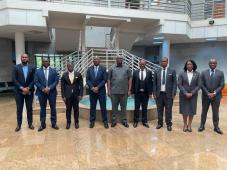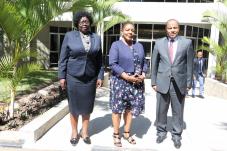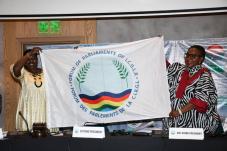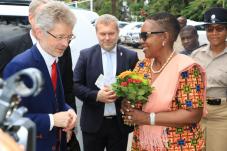IPU Members attending the 134th Assembly in Zambia (19-23 March) will address the critical question of how to rejuvenate democracy and give voice to youth. The Assembly will seek ways to reverse waning youth interest in formal politics - a critical step towards safeguarding and strengthening democracy in all cultures. It will also be an opportunity to explore innovative ideas that enhance and modernize democratic culture, institutions and practice. Other debates will focus on preventing child and forced marriage, environmentally sustainable parliaments, and more open and accountable parliaments. Resolutions on boosting global cooperation to combat terrorism and protecting the world¹s cultural heritage are expected to be adopted at the Assembly. As usual, the event will provide the forum for women MPs to hold their twice-yearly meeting as part of IPU's ongoing work to empower and strengthen women parliamentarians. IPU bodies such as the Committee on the Human Rights of Parliamentarians, the Committee on Middle East Questions and the Advisory Group on HIV/AIDS and Maternal, Newborn and Child Health, will also meet. Hundreds of MPs from around the world, including close to 75 Speakers and Deputy Speakers of Parliament will attend the 134th Assembly, which is being hosted by the Zambian Parliament. The Assembly will take place on the heels of IPU¹s third Global Conference of Young MPs, which has a specific focus on the youth role in delivering the new generation of development goals agreed by world leaders in 2015. IPU Assemblies, held twice a year, bring together MPs from the Organization's 167 Member Parliaments to define policy on key international issues. For those Member Parliaments who still have to register, our online registration system is open until 1 March.
MPs to hold hearing with candidates for next UN Secretary-General - Parliamentarians attending the 134th IPU Assembly in the Zambian capital, Lusaka, next month, will have the opportunity to engage directly with candidates campaigning to be the next UN Secretary-General. Elections for a new UN Secretary-General will take place in the autumn this year with the chosen candidate beginning her/his mandate at the start of 2017. In response to a global call for greater transparency and inclusiveness in the selection process of the next UN leader, all candidates will appear before the UN General Assembly in April, and at the UN Security Council in July. IPU's Committee on United Nations Affairs has invited all declared candidates to discuss their credentials and views on the critical role of the UN Secretary-General with MPs from across the world, and to bring the UN closer to the people through their representatives. The hearing in Lusaka on 22nd March is expected to be seen by viewing parties in several countries, including at Switzerland's Graduate Institute of International and Development Studies. This engagement between the global parliamentary community and the next UN Secretary-General will be an important step in continuing to build a critical long-term relationship between IPU and the UN, says IPU Secretary General Martin Chungong.
Young MPs to focus on delivering development to all - Young Members of Parliament are set to define their role in delivering the new generation of development goals when they meet at their annual Global Conference in Zambia next month. Agenda 2030: Youth leading the way, leaving no-one behind, jointly organized by IPU and the Zambian Parliament, will identify the groups most at risk of being excluded in the implementation of the Sustainable Development Goals (SDGs), and what action is needed. Critical policy areas, including climate change, sustainable development and global economic models, will be highlighted in the programme of discussions and other interactive events. The Conference is being organized with support from the Japanese non-profit organization Worldwide Support for Development (@support4dev) and is open to young members of national parliaments as well as IPU Observers and selected youth organizations, networks and associations. Participants can register using this form. Speakers will include IPU Secretary General Martin Chungong, the UN Secretary-General¹s Youth Envoy Ahmad Alhendawi, and Zambian Government Minister Greyford Monde himself a young MP. Vinay Nayak, a specialist in the use of modern technology in politics, will deliver the keynote address.
IPU young MPs' conferences enable participants to address issues of global significance, as well as facilitate international cooperation and networking. Led by young MPs themselves, the conferences are part of the work of IPU¹s Forum of Young Parliamentarians, which works to empower MPs and encourage youth engagement in formal politics. Decisions from the Young MPs' Conference will be fed into the 134th IPU Assembly, which also takes place in Lusaka a few days later from 19-23 March, and which will focus on rejuvenating democracy and giving voice to youth. Join the debate on Twitter using #YoungMPs
World MPs meet at UN to focus on ending discriminatory laws - An international meeting of MPs at UN Headquarters next month will focus on the ability of legislation to empower women and deliver sustainable development. The event on 15 March will look at the many forms of legal discrimination that persist around the world and how they hamper delivery of the sustainable development agenda. Participants will discuss the best routes to enacting, implementing and enforcing equality laws. Sessions will focus on the role of parliaments in ending discriminatory laws and the importance of women's political leadership and representation in legislative bodies. The event is being hosted by IPU and UN Women to coincide with the 60th session of the ommission on the Status of Women, the main global intergovernmental body exclusively dedicated to the promotion of gender equality and women's empowerment. It will be webcast live via a link on the
IPU website. IPU is also organizing a panel discussion with the UN Economic and Social Commission for Western Asia and the Office for North Africa of the UN Economic Commission for Africa, on 14 March on how UN Security Council resolution 1325 on women, peace and security can be implemented in Arab countries. IPU is strongly committed to working for gender equality in the world¹s parliaments, empowering female MPs, and strengthening parliamentary work to achieve gender equality.
African MPs propose fresh action on migration - Members of Parliament at a conference on African migration have recommended a series of steps to help ensure the maximum benefit migrants could provide to their countries of origin and destination. The MPs from 15 African countries proposed action, including safeguarding migrants' rights, combating racism and intolerance, supporting victims of forced migration, reducing the risk and impact of natural disasters and enforcing existing policies and laws on migration. They also suggested reducing the cost of remittance transfers, boosting migrants' economic literacy, promoting equality of opportunity for men and women, and improving international cooperation, such as using existing African Union mechanisms fully and creating systems to exchange information to combat human trafficking. The benefits of educating people on the good practices and risks of migration were also highlighted. Participants at the event in Djibouti, organized by the African Parliamentary Union and supported by IPU and others, shared their experiences, examples of good practice, and views on the governance of migration in promoting the sustainable development agenda.
IPU-UN Hearing sheds fresh light on drug policy debate - A conference of world MPs at the United Nations in New York has highlighted the need for fresh thinking to meet the challenges of the world drug problem. The parliamentary hearing , jointly organized by IPU and the Office of the President of the UN General Assembly, drew MPs and other experts from around the world to evaluate current drug policy and search for new solutions. The meeting concluded that greater international cooperation was useful, but that countries should take advantage of the flexibility provided by existing conventions to tailor their own solutions to the drug problem.
South Asia Speakers' Summit pledges action on tobacco and SDGs - Speakers of Parliament from across South Asia have pledged to step up action to curb tobacco use, which kills more than 1.5 million people in the region every year. The commitment is part of a comprehensive declaration by the Speakers after a summit on achieving the Sustainable Development Goals (SDGs), internationally agreed targets which include ending extreme poverty and hunger and improving global health by 2030. The Speakers, from Afghanistan, Bangladesh, Bhutan, India, the Maldives and Sri Lanka, pledged wide action to advance the SDGs, reflecting the crucial role of parliaments in making the goals a reality through their key functions of passing laws, overseeing the work of government, allocating budgets and representing citizens.
Myanmar MPs complete induction course - Members of Parliament in Myanmar have taken part in a five-day induction programme intended to equip them to perform their roles. The programme, backed by IPU and the United Nations Development Programme (UNDP), focused on the MPs' three main areas of responsibility passing laws, overseeing the work of government and representing citizens. Current and former MPs from nine countries around the world travelled to Myanmar to share their experiences during the induction, which included specific input for the Asian country's female MPs. The MPs gained an understanding of their role and functions, including committee work, and the knowledge and practical skills needed to carry them
out. Sessions covered diverse topics including the law and practice of the parliament (Hluttaw), key areas of engagement for MPs, and the need for ongoing professional development of their skills. Nearly 460 MPs from all political parties and both houses of parliament took part in the programme. The induction was part of a longer-term plan, led by the parliament and supported by IPU and the UNDP, to ensure the MPs are fully equipped and that the fundamental skills gained during the induction are built on in the future. Many of Myanmar¹s 657 MPs elected in November 2015 are first-time parliamentarians.
IPU to support Egyptian Parliament's push for greater equality, rights and rule of law - The Speaker of the new Egyptian Parliament, Ali Abd Elall Sayed Ahmed, and IPU Secretary General Martin Chungong, have renewed an agreement between the two institutions that paves the way for continued collaboration on strengthening parliament and democracy in Egypt. The two men signed the agreement following talks at IPU Headquarters in Geneva earlier this month. IPU will extend its ongoing support to the Egyptian Parliament to become an effective institution better able to deliver on its democratic mandate. Since the dissolution of the previous Egyptian Parliament in 2013, IPU has been working with Egypt to train and build the capacity of parliamentary staff. Following the elections for the new parliament in late 2015, IPU carried out an induction programme for new MPs. An IPU mission to Egypt between 28 February and 4 March to assess the priority needs of the parliament will form the basis of a fully-fledged support programme responding to the immediate and long-term requirements of the institution, MPs and staff.
IPU Cambodia mission urges dialogue to resolve MPs' cases An IPU delegation visited Cambodia this month to investigate allegations of human rights violations against 12 opposition politicians. The mission, from IPU's Committee on the Human Rights of Parliamentarians, met most of the 12, who have made a number of serious allegations including physical assault, threats, intimidation, violation of their freedom of expression and assembly, and the lack of fair trial guarantees and independence of the judiciary in repeated legal procedures against them. The delegation held a series of high-level meetings with parliamentary, executive and judicial authorities, including the Deputy Prime Minister and Minister of the Interior, the Minister of Justice and the Prosecutor General. Talks were also held with senior leaders of the governing CPP and opposition CNRP parties, and with representatives of the international community and civil society organizations.
E-debate explores parliaments' role in gender equality oversight Politicians, academics, civil society representatives and other experts are being invited to take part in an e-discussion on the oversight role of parliaments in achieving gender equality. Participants can submit recommendations and concrete examples of their own experiences to help establish best practice. Some parliaments now have dedicated mechanisms to ensure the goal of gender equality is reflected in all policy areas. Other parliaments have continued to rely on informal monitoring, traditionally by female MPs. The conclusions of the discussion will be incorporated into the second Global Parliamentary Report, to be published by IPU and the United Nations Development Programme
(UNDP) later this year. The Report will focus on the power of parliaments to hold governments to account. The debate is being hosted by the
International Knowledge Network of Women in Politics (iKNOW Politics).




